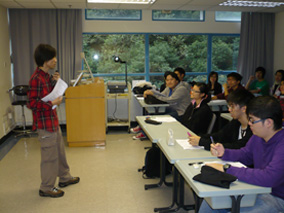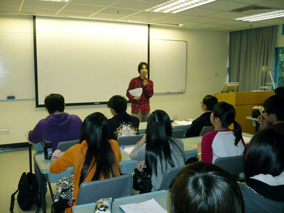"Anyway, I keep
picturing all these little kids playing some game in this big field
of rye and all. Thousands of little kids, and nobody's around —
nobody big, I mean — except me. And I'm standing on the edge of
some crazy cliff. What I have to do, I have to catch everybody if
they start to go over the cliff — I mean if they're running and
they don't look where they're going I have to come out from somewhere
and catch them. That's all I'd do all day. I'd just be the catcher
in the rye and all. I know it's crazy, but that's the only thing
I'd really like to be." (J.D. Salinger)
Dr. Wong Kim Fan graduated from the
Department of English, Hong Kong Baptist University with a BA in
Translation. He went on to study the translation of philosophical
texts and obtained a PhD degree from the same university. His areas
of research interests include translation, travel and philosophy.
Dr. Wong's connection with The Chinese
University of Hong Kong can be traced back to his days as a student,
when he took up teaching and research work at the University. Over
the years, he has taught three courses for University General Education
at CU, namely, 'Human Happiness' , 'Travel and Translation' and
'Classics for Today: In Search of Good Life and Good Society' .
The course 'Human Happiness' aims not to provide students with a
manual for achieving happiness, but to help them contemplate "happiness".
Adopting an inter-disciplinary and cross-cultural approach, the
course invites students to reflect on the problem of "happiness"
in the modern world. For instance, people nowadays generally think
that happiness is a right, but where does this idea come from? What
are the criteria of happiness? Who should set them? Can human beings
be masters of their happiness? For Dr. Wong, it is the wish of everyone
to lead a happy, fulfilling life. But happiness does not just fall
from the sky; only by taking a right approach in life may we hope
to come close to it. How are we to fare the journey of life? This
is not a question to be addressed by the philosopher alone; anyone
aspiring for a wonderful life must deliberate it. Completing a course
on happiness does not necessarily mean a thorough understanding
of "happiness", but it should at least provide students with some
pointers so they can continue their search for an answer of their
own.
'Travel and Translation' explores
the multifaceted relationship between travel and translation from
interdisciplinary perspectives. According to Dr. Wong, the traveler
often manipulates the non-traveler's understanding of the outside
world, because the traveler's prejudice and perception may lead
to distortions of the "facts", and therefore a misinformed understanding
of the world by the non-traveler. Worse still, the translation of
travel writing may result in "double lies"—the original text itself
may not reflect the truth, and the inaccuracy of translation further
distorts the truth. So, the core question of 'Travel and Translation'
is: If intercultural exchange is based on travel and translation,
how "true" is the world we come to know through "language"? The
course challenges students to rethink views they have taken for
granted, so they may see that underlying the reality there are intricate
relationships and power politics at work. In this way, students
will understand how human mobility and intercultural exchange have
constructed the world today. Dr. Wong is good at using real-life
examples and plain language to elucidate difficult concepts. His
use of the history of Chinese translation regarding the word "England"
is a case in point. The name of the country has changed from early
transliterations carrying negative connotations, to later renditions
made up of positive Chinese characters; such a history of translation
reflects the change of China's foreign relations and the power relations
underlying translation. Dr. Wong makes good use of his own travel
experience when designing course assignments, and has engaged students
with lively and interesting assignment topics.


'Classics for Today: In Search of
Good Life and Good Society' aims at engaging students in direct
dialogues with classics of the East and West, addressing questions
related to their life and society, including: What is the meaning
of friendship, love, journey, and glory? What inspirations can we
draw from Christianity, Islam and Buddhism in our quest for a "good"
life and "ideal" society? What makes a "good" society for everyone—a
selfless ruler? a political system that safeguards individual freedom?
or an economic system built upon the maximization of self-interest?
For Dr. Wong, classics play an important role in the history of
civilization. They are books that have stood the test of times,
and every time they are re-read they lead to new insights. Directly
or indirectly, classics help human beings to correct their mistakes,
rid themselves of doubts, and reduce their suffering. Classics are
often rich in contents and profound in meaning, harboring a keen
hope that the world will be a better and happier place. Dr. Wong's
"affair" with classics already began when he was in junior secondary
school. He remembers most vividly his first encounter with Catcher
in the Rye, the inexplicable sadness that lingered, and the mysterious
delight of the language and of the feeling that someone had spoken
his mind. He went on to read up all other works by Salinger that
he could lay his hand on. Back then, he had no idea what "some crazy
cliff" meant. Re-visiting the paragraph again many years later,
he realized it was a good expression of the ideal of education.
When approaching a classic in class, Dr. Wong always provides important
background knowledge before raising questions on core issues for
students' discussions. He believes students are capable of digging
deep and being creative. In the last term, one of his students drew
remarkable parallels between the serpent that tempted Adam and Eve
to eat of the Forbidden Fruit and the man who returned to the cave
after getting a glimpse of the reality outside in Plato's Republic.
Another student wrote a script for a play reinventing the story
of Noah's Ark and submitted it as the term paper. Both examples
bear proof to students' ability to connect and integrate what they
have learnt, and the room Dr. Wong allows for his students to flourish
and thrive.
Dr. Wong thinks that General Education
is absolutely not common-sense chitchat. General Education courses
promote connection and integration of different fields of knowledge,
requiring students to "go out of the box" and break free from their
regular mode of thinking. In doing General Education, students expand
their knowledge base and reflect on problems with multiple perspectives,
seeking to know themselves and then the world, and learning to sympathize,
understand, and accommodate. The same applies to university education.
In addition to acquiring different kinds of knowledge, students
must learn to integrate what they have learnt, and ingeniously apply
the learning to work and life. The ultimate goal is that each will
develop their strengths and potentials to the full, and add a stroke
of beauty to the human world. |

